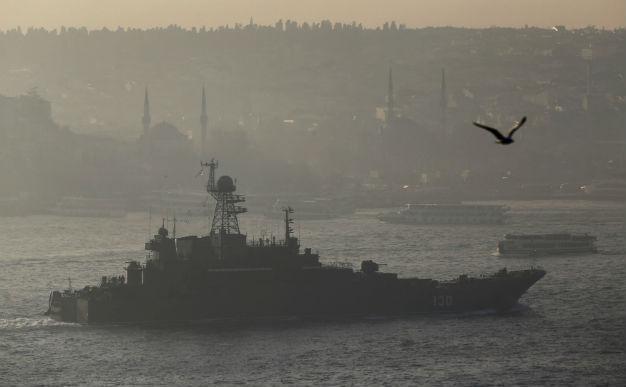Russia replaces Israel at top of threat list for Turks: Survey
ISTANBUL

Russian Navy's large landing ship Korolev sails in the Bosphorus, on its way to the Mediterranean Sea, in Istanbul, Turkey December 23, 2015. REUTERS photo
Most Turks see Russia as the biggest threat to Turkey, according to a survey recently conducted by a university in Istanbul.The Russian Federation posed the biggest threat to Turkey last year, according to the Survey of Social-Political Trends in Turkey 2015, which was conducted by Kadir Has University in Istanbul.
“Although Israel had been at the top of the list of countries thought to ‘pose the biggest threat to Turkey’ since 2011, this year the Russian Federation replaced Israel on this list. The percentages of those who consider the Unites States, Syria and Israel to pose a threat to Turkey have fallen in 2015,” the university said in a press statement on Jan. 12, announcing the survey results.
The survey aiming to reflect yearly changes in public opinion in the country was conducted between Dec. 9 and 17, 2015, with 1,000 respondents aged 18 and above residing in the city centers of 26 cities. The respondents were asked questions on Turkish politics, economics and social relations in face-to-face interviews. The results were announced at a press conference in the Fener Hall of the university’s campus in Cibali, a neighborhood near the Golden Horn.
In 2015, Turks saw terror as the most serious problem, according to the survey results.
“While 13.9 percent of participants indicated terror to be the most serious problem in the country in 2014, this rate went up to 39.3 percent in 2015,” the statement said, adding that the second most significant problem was unemployment last year.
“Unemployment, seen as the second most important problem in 2015 at 16.3 percent, has fallen significantly from the much higher rate of 33 percent recorded for the previous year,” it added.
According to the survey results, most Turks see the fight again terrorism, including counterterrorism activities targeting the outlawed Kurdistan Workers’ Party (PKK) specifically, as unsuccessful.
“Last year, 39.2 percent of respondents stated that military methods were the most effective way to solve this problem. This year however, the same response has fallen to 31.6 percent. The ratio of respondents who regard political measures as being the best remedy for terror has remained unchanged since the previous year at 30.9 percent,” the statement said, depicting a considerable fall in the number of Turks who think terrorism should be solved using military means.
Almost half of the respondents stated they found the Turkish government’s performance in the fight against the PKK to be unsuccessful, according to the statement, which also said that 54.2 of the respondents stated Turkey was in danger of being divided in 2015.
“In 2014, this rate was 46.2 percent. When this result is evaluated in terms of political party allegiance, regions and ethnic background, the perception that Turkey is in danger of being divided appears to be the common perception across Turkey,” the statement said.
Given that the country has seen three major terrorist attacks, namely the suicide bombing at the Peoples’ Democratic Party (HDP) rally in the southeastern city of Diyarbakır ahead of the June 7 election, the bombing in the southeastern town of Suruç in late July and the twin blasts that rocked the Turkish capital ahead of a peace-themed gathering on Oct. 10, all reportedly carried out by Islamic State of Iraq and the Levant (ISIL) militants in 2015, less Turks saw ISIL as a terrorist organization in 2015 compared to the previous year’s public opinion toward the jihadist group.
“Those who describe ISIS [ISIL] as a terror group decreased from 93.2 to 86.4 percent since last year. While in the last survey, 82.3 percent of respondents described ISIS as a threat to Turkey, this rate has decreased to 78 percent this year,” the statement said.
More than half of the respondents found the Turkish military successful, according to the survey results, while it was seen as the most trusted institution in 2015.
“The Turkish Armed Forces [TSK] were once again the most trusted institution. While 62.4 percent of respondents stated that they considered the TSK to be successful, police forces were the second most trusted institution at 51.9 percent and universities were third at 49.8 percent. The least trusted institutions were the parliament at 31.8 percent, the media at 27.8 percent and political parties at 33.9 percent,” said the statement.
According to the survey results, more than two-third of Turks thought Turkey needed a “parliamentary democracy” more than a unitary presidential system.
“Some 68.9 percent of respondents stated their preference for a ‘parliamentary democracy.’ Despite a 10 point increase from last year, support for a presidential system remained low at 22.1 percent. 32.2 percent of participants gave as their main reason for not wanting a presidential system as the possibility that this would ‘increase the polarization of society’ and 27.1 percent of participants thought a presidential system would lead to ‘one-man rule,’” the statement said.
















